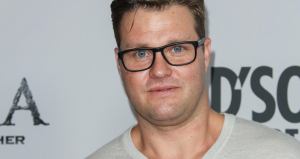Vangelis, the innovative Greek composer who won an Oscar for writing the iconic Chariots of Fire score, died Tuesday, the Athens News Agency reported. He was 79. The musician reportedly died in a French hospital while being treated for COVID-19, reports Variety.
Vangelis, born Evángelos Odysséas Papathanassíou, was a self-taught musician who succeeded in the European pop sphere during the 1970s. After moving to London in 1975, he released a series of albums for RCA and recorded with Yes singer Jon Anderson. After PBS used a track from his album Heaven and Hell as the theme for Carl Sagan’s Cosmos, Hollywood came calling.
Videos by PopCulture.com
In 1981, Vangelis became an overnight sensation thanks to his unique score for the British sports drama Chariots of Fire. Vangelis performed the entire score by himself, including the synthesizer that made the score stand out. The theme helped the soundtrack top the Billboard chart and earn a Grammy Record of the Year nomination. Although he declined to attend the 1982 Academy Awards, he still won the Best Original Score Oscar, beating out John Williams’ Raiders of the Lost Ark score.
After Chariots of Fire changed his life, Vangelis’ sound became an iconic piece of 1980s music. Ridley Scott hired him for Blade Runner, and Costa-Gavras asked him to score Missing. Both movies opened in 1982 and earned Vangelis BAFTA nominations. Vangelis’ other credits include The Bounty (1984), Vampire in Venice (1988), Bitter Moon (1992), 1492: Conquest of Paradise (1992), and Twilight of Shadows (2014). Vangelis also scored dozens of documentaries. NASA used his symphony “Mythodea” as the theme for the 2001 Mars Odyssey mission.
Vangelis was born on March 29, 1943, and raised in Athens. He taught himself to play piano and formed a rock band in 1963. When he moved to Paris, he began recording with Aphrodite’s Child, a group made up of other greek expatriates. After the group split, he moved to London. The rock band Yes asked him to join after Rick Wakeman left. He declined but started working with Anderson. They recorded four albums in the 1980s.
The musician became reclusive later in his career and very little is known about his personal life. He was reportedly married twice and had no children. Last year, he released his final studio album, Juno to Jupiter, inspired by NASA’s Juno probe.








